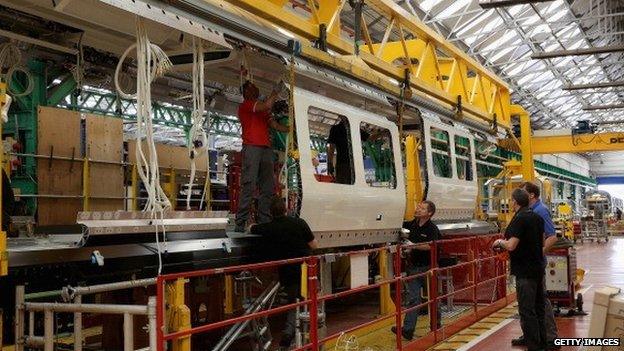Weep for falling productivity
- Published
- comments

Bombardier workers in Derby, where new London Underground carriages are being made
We should be both grateful and worried that British productivity has been so lousy since the great crash and recession.
The point is that a big contributor to the absence of any growth at all in output per worker and output per hour is that employment has grown much faster than national income: unemployment rose proportionately less in the downturn than in previous recessions and new jobs have been created faster than the growth in output.
But if that's the good news, there is also a very troubling corollary.
Lower productivity undermines the competitiveness of British firms in the global economy.
And the absence of productivity growth undermines the ability of British firms to increase our pay.
Here is perhaps the best way of seeing how serious the slump in productivity has been.
On the basis of the figures published on Wednesday, if the productivity trends of 1992 to 2007 had continued from 2008 to the end of last year, output per job would be 15% higher than it is, and output her hour would be 17% higher.
Which means, all other things being equal, each of us would be paid 15% more in total, and 17% more for each standard shift we put in.
In reality, since the start of the recession, and after adjusting for taxes, benefits, interest costs and inflation, we're on average about 2% better off (and see what I wrote yesterday about what's been happening to our living standards since the 2010 general election.
Just think and weep over how much richer we all would have been if our productivity had not been so hopeless.
Which is why it matters that in the last three months of 2014 there was no recovery in productivity. In fact output per hour fell by 0.2% - because the number of hours worked rose 0.8% while gross value added, or the output of the economy, increased by just 0.6%.
And there was a particularly sharp fall of 1.3% in the output per hour of those working in manufacturing, which wiped out a small 0.2% improvement in the productivity of the much larger services sector.
Why has productivity been so limp?
There are plenty of competing explanations, which include:
1. Productivity growth before the crash was exaggerated by the spurious productivity of banks and City firms that were taking crazy economy-imperilling risks;
2. Since the crash, too many lame duck firms have been kept afloat, under pressure from politicians, preventing the necessary re-allocation of capital from low-productivity firms to better ones;
3. As a nation we're lousy at innovation and we don't have enough highly skilled people (compared with Germany, for example);
4. The City is too short-termist and is hopeless at investing in winners;
5. Companies lack the confidence to invest adequately in expensive new kit, and would rather incur the costs of taking on cheap people to boost output, confident they can fire these people if all goes pear-shaped.
Getting to the root of the problem matters. Because unless we can improve productivity, we won't be able to afford the living standards we feel we deserve.
And sorting productivity also massively matters to Labour and Tories. Without a recovery in productivity and an associated boost to earnings, tax revenues would remain under pressure, making it all the harder to get the Government's huge deficit down to a more affordable level.